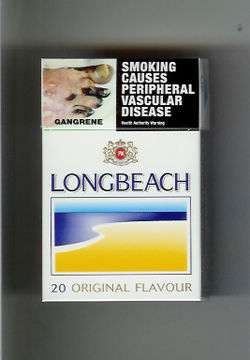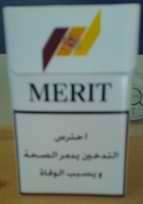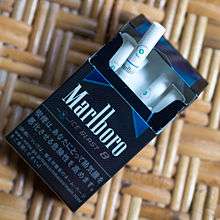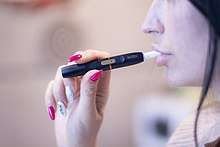Philip Morris International
Philip Morris International Inc. (PMI) is an American multinational cigarette and tobacco manufacturing company, with products sold in over 180 countries.[2] The most recognized and best selling product of the company is Marlboro.[3]
| Public | |
| Traded as |
|
| ISIN | US7181721090 |
| Industry | Tobacco |
| Predecessor | Rothmans International |
| Founded | 2008 spin-off company / 1847 original |
| Founder | Philip Morris |
| Headquarters | New York City, United States |
Area served | Worldwide (excluding the United States) |
Key people | Louis Camilleri (Chairman) André Calantzopoulos (CEO) |
| Products | Cigarettes, cigars, Codentify, fine-cut rolling tobacco, snuff, rolling papers and tubes |
| Revenue | |
| Total assets | |
| Total equity | |
Number of employees | 77,400 (2018)[1] |
| Subsidiaries | Sampoerna PMFTC, Inc. Rothmans, Benson & Hedges Papastratos Philip Morris International |
| Website | www |
| Footnotes / references [1] | |
Until a spin-off in March 2008, Philip Morris International was an operating company of Altria. Altria explained the spin-off, arguing PMI would have more "freedom" i.e. leeway outside the responsibilities and standards of American corporate ownership in terms of potential litigation and legislative restrictions to "pursue sales growth in emerging markets", while Altria focuses on the American domestic market.[4] The shareholders in Altria at the time were given shares in PMI, which was listed on the London Stock Exchange and other markets.
The company's legal seat is in New York City,[5] yet it does not operate in the United States of America. Philip Morris USA, a subsidiary of PMI's former owner American parent Altria group owns the Philip Morris brands there. Operational headquarters are in Lausanne, Switzerland.[6]
With tobacco being addictive and the single greatest cause of preventable death globally,[7] the company is highly controversial, not least because of its history of obfuscating scientific evidence around the health impacts of smoking. It has been the subject of litigation and restrictive legislation from governments.
In response to burgeoning awareness of the harm to health of cigarettes, PMI has declared on its homepage the intention to replace cigarettes with smoke-free products, and to "switch ... adult smokers" to these products as the first phase of a business strategy, as a responsible decision for the benefit of "adult smokers" and the companies shareholders and employees.[8][9][10]
With the world-wide decrease in smoking in the 21st century, shares of Philip Morris were no longer considered the "safe haven" they once were.[11] The company ranked No. 108 in the 2018 Fortune 500 list of the largest corporations by total revenue.[12]
History
Early development
The company states its history is traced to a London tobacconist, Philip Morris, opening a single shop on London’s Bond Street in 1847 which sold tobacco and cigarettes.[13][14] In 1881, Philip Morris' son, Leopard Morris, established "Philip Morris & Company and Grunebaum Ltd" with Joseph Grunebaum.[3] In 1885, the company changed its name to "Philip Morris & Co. Ltd." [3]
In 1894, William Curtis Thomson and his family began to control the company, and in 1902 the company was incorporated in New York.[3] In 1919, the American business was acquired and incorporated as "Philip Morris & Co. Ltd., Inc." in Virginia.[3]
Later development
In 1954, Philip Morris (Australia) became the first affiliate of Philip Morris & Co., Ltd, Inc. outside the U.S. In 1972, the company's Marlboro became the world's top-selling cigarette brand.[3]
In 1987, Philip Morris International (PMI) was incorporated as an operating company of Philip Morris Companies Inc.[3]

In 2001, the operations center of the company was transferred from Rye Brook, New York, to Lausanne, Switzerland.[3][15] On January 27, 2003, Philip Morris Companies Inc. formally changed its name to the Altria Group.[16] In March 2008, Philip Morris International was spun off from Altria.[17]
In April 2014, Philip Morris International announced that it would close its Moorabbin plant in Australia by the end of 2014 after operating for 60 years, due to the gradual decline of sales in the last ten years and difficulties conforming to 2010 Australian government regulation about reducing fire risks.[18] In 2015, the company sold 850 billion cigarettes.[19]
In August 2018 Reuters reported that Philip Morris "has been among foreign companies with exposure to Russia’s tobacco market. The company’s sales exposure to Russia is 7 percent, according to a note from Goldman Sachs."[20]
As of 2019, main institutional investors are The Vanguard Group with an 8% stake, Capital Research & Management with 5% and BlackRock Fund Advisors with 4%.[21]
Brands

Philip Morris International has six multibillion US$ brands including:
- Dji Sam Soe 234 was launched in 1913 and is a brand of Kretek cigarettes. It is the best seller of Kretek cigarettes in Indonesia.
- L&M was launched by Liggett & Myers in 1953 with the tagline: "American cigarettes of the highest quality with the best filter." L&M variants include full flavor shorts, full flavor 100s, lights, ultra lights, menthol shorts, menthol 100s, menthol light shorts, menthol light 100s, Turkish Blend shorts, Turkish Blend 100s, and L&M Mild Kretek.
- Longbeach include in Australia and Indonesia in 1999. Longbeach variant include: Longbeach Filter and Longbeach Mild.
- Marlboro was launched in 1904. Marlboro is the premium brand. Marlboro variants include: Marlboro Special, Marlboro Menthol, Marlboro Lights, Marlboro Lights Menthol, Marlboro Mix-9 Filter Kretek, Marlboro Flavor Plus, Marlboro Black Menthol, and Heatsticks, a heated tobacco product.[22] The company's Marlboro brand ranked first among the most valuable tobacco brands of 2017 on BrandFinance's website,[23] which uses the royalty relief method of brand valuation.[24]
- ST Dupont Paris is the brand cigarette designed by Simon Tissot Dupont in 1902. With the black packaging. ST Dupont Paris variants include: filter, lights, menthol, and menthol lights.
- U Mild was launched in Indonesia on 22 May 1998 after the Indonesian revolution. U Mild is a Mild Kretek cigarette sold in Indonesia.

 Dji Sam Soe 234
Dji Sam Soe 234

- Marlboro
 ST Dupont Paris
ST Dupont Paris


 Marlboro Ice Blast
Marlboro Ice Blast
Board of directors
Information from company website.[25]
- Harold Brown
- André Calantzopoulos
- Louis C. Camilleri – Chairman
- Massimo Ferragamo
- Werner Geissler
- Lisa Hook
- Jennifer Li
- Jun Makihara
- Kalpana Morparia
- Lucio A. Noto
- Frederik Paulsen Jr
- Robert B. Polet
- Stephen M. Wolf
Finances
For the fiscal year 2017, Philip Morris reported earnings of US$6.021 billion, with an annual revenue of US$78.098 billion, an increase of 4.2% over the previous fiscal cycle. Its shares traded at over $105 per share, and its market capitalization was valued at over US$138.4 billion in October 2018.[26]
| Year | Revenue in mil. US$ |
Net income in mil. US$ |
Total Assets in mil. US$ |
Price per Share in US$ |
Employees |
|---|---|---|---|---|---|
| 2005 | 45,316 | 5,616 | |||
| 2006 | 48,302 | 6,130 | |||
| 2007 | 55,243 | 6,038 | 31,777 | ||
| 2008 | 63,640 | 6,890 | 32,972 | ||
| 2009 | 62,080 | 6,342 | 34,552 | 29.38 | |
| 2010 | 67,713 | 7,226 | 35,050 | 36.76 | |
| 2011 | 76,346 | 8,542 | 35,488 | 49.55 | |
| 2012 | 77,393 | 8,752 | 37,670 | 66.44 | |
| 2013 | 80,029 | 8,531 | 38,168 | 71.33 | 91,100 |
| 2014 | 80,106 | 7,459 | 35,187 | 70.34 | 82,500 |
| 2015 | 73,908 | 6,849 | 33,956 | 72.75 | 80,200 |
| 2016 | 74,953 | 6,948 | 36,851 | 88.03 | 79,500 |
| 2017 | 78,098 | 6,021 | 42,968 | 105.35 | 80,600 |
Research
Philip Morris International's research center is located in Neuchatel, Switzerland and houses Philip Morris International's product research and development program.[27] As of April 2018, earnings reports showed the company had spent $4.5 billion on four products: two that heat rather than burn tobacco, and two other nicotine products.[28] One of these heat-not-burn tobacco products is IQOS.[29]
It is funding the Foundation for a Smoke-Free World (founded in 2017) to purportedly fund scientific research for the global elimination of tobacco smoking and has adopted a goal of making cigarettes obsolete by 2035. Its claims to independence have been challenged[30][31][32] and it has been criticised by the Campaign for Tobacco-Free Kids, Action on Smoking and Health (ASH), and Corporate Accountability International.[31] The American Cancer Society stated, "This attempt by Philip Morris International to paint itself as a public health partner is manipulative and dangerous. It is a new twist out of the tobacco industry’s deadly playbook, but nobody should be fooled. It’s a continuation of a decades-long effort to paint over tobacco’s role in spreading death and misery around the globe."[33] Advocacy groups that are indirectly funded by Philip Morris International through the Foundation for a Smoke-Free World are contradicting public health officials, who say smoking puts individuals at greater risk for a more serious case of COVID-19.[34]
Controversies
Australia
The Australian Government announced it would introduce "Tobacco Plain Packaging Laws" on 29 April 2010. Philip Morris International (PMI), arranged for its wholly owned Hong Kong subsidiary Philip Morris Asia (PMA) to 'takeover' two Australian subsidiaries - Philip Morris Australia Limited and Philip Morris Limited on 23 February 2011. In June 2011, Philip Morris International announced that it was using ISDS provisions in the Australia-Hong Kong Bilateral Investment treaty (BIT) to demand compensation for Australia's plain cigarette packaging anti-smoking legislation.[35] It was one of several tobacco companies to launch legal action against the Australian Government.[36] British American Tobacco, Philip Morris, Imperial Tobacco and Japan Tobacco International are taking the Australian government to the High Court of Australia to try to stop the government of Australia from introducing plain packaging for tobacco products.
Two challenges to the tobacco plain packaging legislation were heard by the High Court of Australia between 17 and 19 April 2012: 'British American Tobacco Australasia Limited and Ors v. Commonwealth of Australia' and 'J T International SA v. Commonwealth of Australia'.
On 15 August 2012, the High Court handed down orders for these matters, and found that the Tobacco Plain Packaging Act 2011 is not contrary to s 51(xxxi) of the Constitution. On 5 October 2012, the Court handed down its reasons for the decision. By a 6:1 majority (Heydon J in dissent) the Court held that there had been no acquisition of property that would have required provision of 'just terms' under s51(xxxi) of the Constitution.[37]
On 18 December 2015, the Tribunal instituted by the United Nations Commission on International Trade Law (UNCITRAL) issued a unanimous decision (3-0) agreeing with Australia's position that the Tribunal has no jurisdiction to hear PMA's claim. This was due to the fact that PMI used its wholly owned subsidiary PMA to takeover the Australian-based PM subsidiaries in order to specifically sue the Australian Government for bringing in plain packaging laws. PMI was unable to do this itself as the Australia–United States free-trade agreement signed in 2004 did not have any investor-state dispute settlement clauses included—by design.[37]
In 2017, the Dispute Settlement Body of the World Trade Organization supported Australia's right to enforce plain packaging.[38] In 2017, PMI was instructed to pay the Australia government's legal costs, an estimated 50 million dollars.[39]
In March 2018, the Tobacco giant announced that it will cut 150 jobs as part of a major restructure. Tammy Chan, the managing director in Australia, said more efficient ways to deal with retailers were introduced based on digital technology development.[40]
European Union
In 2004, Philip Morris and the European Union reached an agreement according to which Philip Morris would pay $1.25bn until 2016 to end a lawsuit over smuggling charges.[41]
Norway
Philip Morris also sued Norway over the country's ban on displaying tobacco products in stores. It lost the case in 2012.[42]
Uruguay
In 2010, the company lobbied against Uruguay's strong anti-smoking laws[43] and filed a complaint against the country (Philip Morris v. Uruguay) under the Switzerland-Uruguay bilateral investment treaty.[44] On 8 July 2016, the International Centre for Settlement of Investment Disputes ruled in favour of Uruguay.[45]
United Kingdom
In August 2014, the company foreshadowed legal action against the Government of the United Kingdom if it went ahead with plans to introduce plain packaging. In a submission to the government, Philip Morris International said it would seek compensation running into "billions of pounds," if the proposed legislation went ahead.[46]
In 2018, an advertising campaign was criticized as hypocritical for urging smokers to quit while promoting other products such as heated tobacco.[47]
IQOS

In 2017, according to two editors of the journal JAMA Internal Medicine, after publication of a research letter describing harmful chemicals in heat-not-burn tobacco products, people from Philip Morris International contacted the institutions where the researchers worked and questioned the methods used in the study; the editors described this as a form of "pressure to suppress discourse that could harm commercial interests".[48]
In December 2017, Reuters published documents and testimonies of former employees detailing irregularities in the clinical trials conducted by Philip Morris International for the approval of the IQOS product by the FDA.[49]
Other
From the 1970s to the late 1990s, Phillip Morris along with British American Tobacco, was involved in campaigns to undermine bans against smoking in Muslim majority countries by branding Muslims who opposed smoking as a "'fundamentalist’ who wishes to return to sharia law," and be "a threat to existing government as” according to leaked documents.[50] A 1985 report from Philip Morris squarely blamed the World Health Organization: “This ideological development has become a threat to our business because of the interference of the WHO [...] The WHO has not only joined forces with Muslim fundamentalists who view smoking as evil, but has gone yet further by encouraging religious leaders previously not active anti-smokers to take up the cause."[50] Philip Morris has refused to comment on these findings.[50]
Philip Morris International has announced an overhaul of its human rights protections of tobacco workers in Kazakhstan and 30 other countries after critical reports.[51]
The company runs an information web site outlining the health issues of tobacco. However, it has been criticised in an article in the journal Public Health Nursing as merely a "public relations effort" intended to "undermine public health".[52]
In the 1930s, the company's tobacco advertisements were a steady source of income for numerous medical organizations and journals, including the New England Journal of Medicine (NEJM) and the Journal of the American Medical Association (JAMA).[53]
In February 2015, John Oliver highlighted the company's many international legal cases on an episode of his television show Last Week Tonight. He also attempted to raise awareness for his campaign using the hashtag #JeffWeCan.[54]
Sponsorship

Philip Morris is a long-term main sponsor of the Formula One team Scuderia Ferrari.[55] The sponsorship is subliminal in the logo these days due to restriction in tobacco sponsorship, but Marlboro-branded Ferrari and McLaren cars won several world titles with famous drivers such as Alain Prost, Ayrton Senna and Michael Schumacher. Philip Morris also sponsored several title winners in MotoGP in road racing and Indy Cars. The Ferrari Formula One deal before direct sponsorships was banned was estimated to be worth £45 million a year as well as paying the multi-million salary of Schumacher.[56]
Despite no longer being able to display the Marlboro logo on Ferrari cars, Philip Morris renewed its sponsorship deal with Ferrari in 2011,[57] 2015,[58] 2017,[59] and 2018 up until 2021.[60] The 2017 deal was reported to be worth $160 million a year.[61]
Philip Morris' sponsorship of Ferrari was seen visually on the car again at the 2018 Japanese Grand Prix, with the cigarette company's "Mission Winnow" branding. This branding has been seen by authorities as an attempt to flout laws and rules banning tobacco advertising, and it was removed by Ferrari for the 2019 Australian Grand Prix after Australian authorities launched an investigation.[62] Ferrari also decided to remove the branding for the 2019 Canadian Grand Prix and the 2019 French Grand Prix to avoid problems with bans on tobacco advertising.[62]

See also
References
- "US SEC: Form 10-K Philip Morris International Inc" (PDF). United States Securities and Exchange Commission. Retrieved 28 March 2018.
- "Key Milestones". www.pmi.com. Retrieved 20 July 2018.
- "Altria to spin off Philip Morris International". NBC News. AP. 29 August 2007. Retrieved 19 December 2011.
- "About us". www.pmi.com. Retrieved 8 May 2020.
- WHO Report on the Global Tobacco Epidemic, 2008: the MPOWER package (PDF). Geneva: World Health Organization. 2008. ISBN 978-92-4-159628-2.
- https://www.pmi.com/who-we-are/designing-a-smoke-free-future, https://www.pmi.com/who-we-are/our-goal-and-strategies
- Tiffany Kary (April 17, 2019). "Philip Morris Says It Doesn't Want You to Buy Its Cigarettes", Bloomberg accessed April 18, 2019
- Zlata Rodionova (30 November 2016). "André Calantzopoulos said he would like to work with governments towards the 'phase-out' of cigarettes", The Independent, accessed April 18, 2019
- Felsted, Andrea (27 September 2018). "Has the Marlboro Man Gasped His Last?". Opinion. Bloomberg. Archived from the original on 27 September 2018.
- "Fortune 500 Companies 2018: Who Made the List". Fortune. Retrieved 10 November 2018.
- "Philip Morris Companies Inc. - Company Profile, Information, Business Description, History, Background Information on Philip Morris Companies Inc". www.referenceforbusiness.com. Retrieved 30 March 2018.
- "Philip Morris International on the Forbes Global 2000 List". Forbes. Retrieved 20 July 2018.
- "Where to find us." Philip Morris International. Retrieved on 19 October 2009.
- Smith, Elizabeth A.; Malone, Ruth E. (April 2003). "Altria Means Tobacco: Philip Morris's Identity Crisis". American Journal of Public Health. 93 (4): 553–556. doi:10.2105/AJPH.93.4.553. ISSN 0090-0036. PMC 1447789. PMID 12660196.
- "Altria - Investors - Press Release". investor.altria.com. Archived from the original on 5 January 2017. Retrieved 20 July 2018.
- Michael Janda. "Philip Morris to quit Australian cigarette manufacturing". Retrieved 9 September 2014.
- "Cigarettes: Smoke signals".
- "Factbox: U.S. companies with exposure to Russia". Reuters. 9 August 2018.
- "Philip Morris International information". CNN Business. Retrieved 24 April 2020.
- Felberbaum, Michael (26 June 2014). "Philip Morris Int'l to Sell Marlboro HeatSticks". Richmond, Virginia: ABC News. AP. Retrieved 28 June 2014.
- "Best Global Brands | Brand Profiles & Valuations of the World's Top Brands". brandirectory.com. Retrieved 30 March 2018.
- "Explanation of the Methodology". brandirectory.com. Retrieved 18 January 2019.
- "Board of Directors". Retrieved 14 August 2018.
- "Philip Morris International - AnnualReports.com". www.annualreports.com. Retrieved 25 November 2018.
- "Philip Morris International Bets Big on the Future of Smoking". Forbes. Retrieved 14 August 2018.
- "Philip Morris Plunges the Most in a Decade on Slump in Cigarettes". Bloomberg. Retrieved 14 August 2018.
- Lasseter, Tom; Bansal, Paritosh; Wilson, Thomas; Miyazaki, Ami; Wilson, Duff; Kalra, Aditya. "Scientists describe problems in Philip Morris e-cigarette experiments". Reuters. Retrieved 30 March 2018.
- van der Eijk, Yvette; Bero, Lisa A.; Malone, Ruth E. (21 September 2018). "Philip Morris International-funded 'Foundation for a Smoke-Free World': analysing its claims of independence". Tobacco Control: 054278. doi:10.1136/tobaccocontrol-2018-054278. ISSN 1468-3318. PMID 30242044.
- Boseley, Sarah (13 September 2017). "Tobacco company launches foundation to stub out smoking". The Guardian.
- Daube, Mike; Moodie, Rob; McKee, Martin (14 October 2017). "Towards a smoke-free world? Philip Morris International's new Foundation is not credible". Lancet. 390 (10104): 1722–1724. doi:10.1016/S0140-6736(17)32561-8. ISSN 1474-547X. PMID 29047432.
- "American Cancer Society Statement on Philip Morris International Support of New Effort". American Cancer Society. 2017.
- Kary, Tiffany (21 April 2020). "Philip Morris Money Is Funding Pro-Vaping Virus Spin". BloomBerg.
- Klya Tienhaara and Thomas Faunce Gillard Must Repel Big Tobacco's Latest Attack. Archived 7 August 2011 at the Wayback Machine Canberra Times 28 June 2011
- "Plain packaging challenge faces High Court". ABC News. Retrieved 12 July 2012.
- Australian Government Attorney-Generals Department Archived 29 November 2015 at the Wayback Machine, retrieved 20 December 2015
- "Australia wins landmark tobacco WTO packaging case, reports". The Sydney Morning Herald. 5 May 2017. Retrieved 9 July 2017.
- Gartrell, Adam (9 July 2017). "Philip Morris ordered to pay Australia millions in costs for plain packaging case". The Sydney Morning Herald. Retrieved 9 July 2017.
- Toscano, Nick (6 March 2018). "Cigarette giant Philip Morris slashes Australian workforce". Canberra Times. Retrieved 30 March 2018.
- Tran, Mark (9 July 2004). "Philip Morris reaches $1.25bn EU agreement". theguardian.com. The Guardian. Retrieved 22 March 2018.
- "Norway: Prohibition on the visible display of tobacco products at the points of sale". WHO.
- Carroll, Rory (27 July 2010). "Uruguay bows to pressure over anti-smoking law amendments". The Guardian. Retrieved 9 July 2017.
- BBC (12 March 2010). "Tabacalera Philip Morris demanda a Uruguay" (in Spanish). Retrieved 15 November 2010.
- "Phillip Morris loses tough-on-tobacco lawsuit in Uruguay". Reuters. 8 July 2016. Retrieved 9 July 2016.
- "Plain cigarette packing plan sees Philips Morris threaten legal action". London Mercury. 12 August 2014. Retrieved 14 August 2014.
- Hope, Katie. "Phillip Morris accused of hypocrisy over anti-smoking ad". BBC News. Retrieved 20 June 2019.
- Katz, MH; Redberg, RF (6 November 2017). "Science Requires Open Discourse". JAMA Internal Medicine. 178: 15. doi:10.1001/jamainternmed.2017.5763. PMID 29114738.
- Lasseter, Tom; Bansal, Paritosh; Wilson, Thomas; Miyazaki, Ami; Wilson, Duff; Kalra, Aditya (20 December 2017). "Scientists describe problems in Philip Morris e-cigarette experiments". Reuters.
- Boseley, Sarah (20 April 2015). "How tobacco firms tried to undermine Muslim countries' smoking ban". The Guardian. Retrieved 5 February 2017.
- Philip Morris International Overhauls Labor Protections. Human Rights Watch, 22 May 2011.
- Elizabeth A. Smith and Ruth E. Malone, R.N., F.A.A.N. (2008), "Philip Morris's Health Information Web Site Appears Responsible but Undermines Public Health", Public Health Nurs., 25 (6): 554–64, doi:10.1111/j.1525-1446.2008.00743.x, PMC 2794243, PMID 18950420CS1 maint: multiple names: authors list (link)
- Martha N. Gardner & Allan M. Brandt (2006), "The Doctors' Choice Is America's Choice", Am J Public Health, 96 (2): 222–32, doi:10.2105/AJPH.2005.066654, PMC 1470496, PMID 16434689
- "#jeffwecan Campaign Launch". John Oliver Last Week Tonight.
- "Philip Morris International". Scuderia Ferrari. Retrieved 30 March 2015.
- Day, Julia (23 February 2001). "Philip Morris strengthens Ferrari ties". The Guardian. Retrieved 31 March 2015.
- ESPN F1 Staff (14 June 2011). "Ferrari extends deal with tobacco company Philip Morris". Retrieved 12 June 2019.
- Pablo Elizalde (14 May 2015). "Philip Morris extends Ferrari deal". Retrieved 12 June 2019.
- Laurence Edmondson (4 September 2017). "Ferrari renews Philip Morris partnership". Retrieved 12 June 2019.
- "Philip Morris extend Ferrari sponsorship deal". 21 February 2018. Retrieved 12 June 2019.
- thejudge13 (12 December 2017). "FERRARI'S TOBACCO MONEY: A RETURN TO ADVERTISING ON CARS?". Retrieved 12 June 2019.
- Scott Mitchell (28 May 2019). "Ferrari to replace Mission Winnow branding for Canadian, French GPs". Retrieved 12 June 2019.
External links
| Wikiquote has quotations related to: Philip Morris International |